Public Health Analysis: Depression Among Retirees and Senior Citizens
VerifiedAdded on 2023/03/23
|13
|3379
|77
Essay
AI Summary
This essay addresses the critical public health issue of depression among retirees and senior citizens, highlighting its prevalence, impact, and social determinants. It defines depression, discusses its incidence, and examines its effects on appetite, sexual function, sleep, and gastrointestinal health. The essay further explores social factors like social support, loneliness, life stressors, and income that contribute to depression in older adults. It also reviews the Mental Health Policy by the Public Health Association of Australia (PHAA) as an example of a health policy addressing depression, emphasizing the importance of prevention, treatment, and access to mental health care. This comprehensive analysis provides insights into understanding and addressing depression in the elderly population.
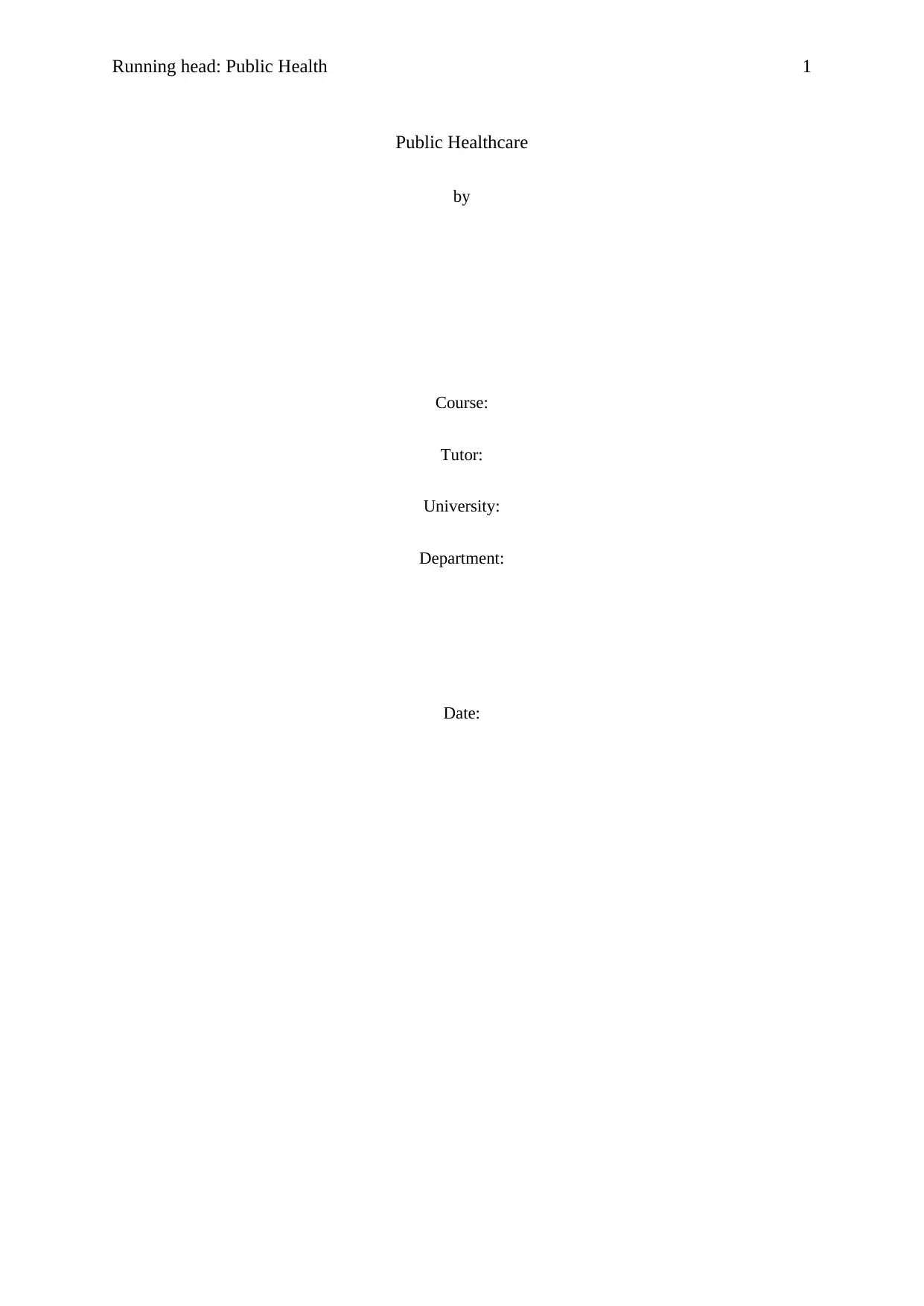
Running head: Public Health 1
Public Healthcare
by
Course:
Tutor:
University:
Department:
Date:
Public Healthcare
by
Course:
Tutor:
University:
Department:
Date:
Paraphrase This Document
Need a fresh take? Get an instant paraphrase of this document with our AI Paraphraser
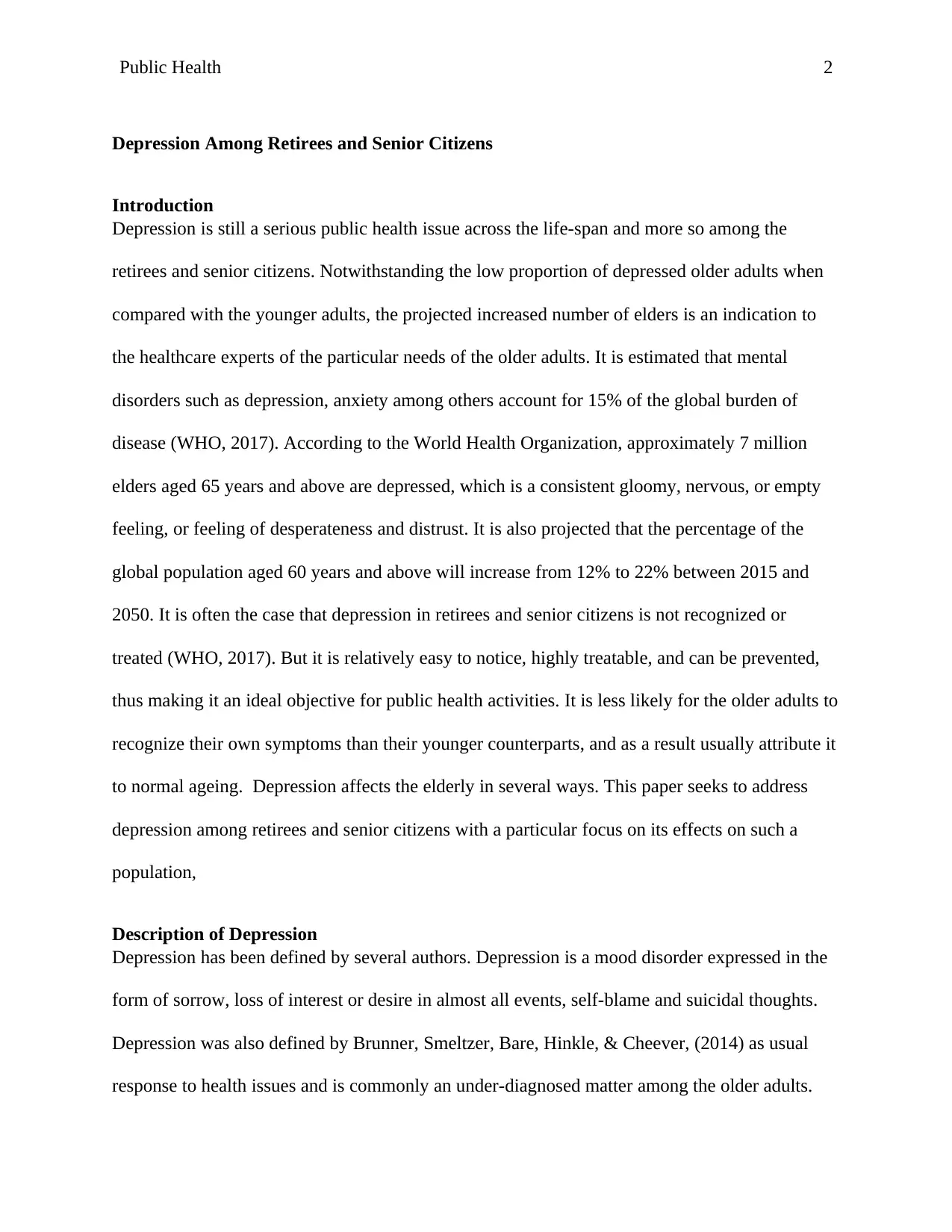
Public Health 2
Depression Among Retirees and Senior Citizens
Introduction
Depression is still a serious public health issue across the life-span and more so among the
retirees and senior citizens. Notwithstanding the low proportion of depressed older adults when
compared with the younger adults, the projected increased number of elders is an indication to
the healthcare experts of the particular needs of the older adults. It is estimated that mental
disorders such as depression, anxiety among others account for 15% of the global burden of
disease (WHO, 2017). According to the World Health Organization, approximately 7 million
elders aged 65 years and above are depressed, which is a consistent gloomy, nervous, or empty
feeling, or feeling of desperateness and distrust. It is also projected that the percentage of the
global population aged 60 years and above will increase from 12% to 22% between 2015 and
2050. It is often the case that depression in retirees and senior citizens is not recognized or
treated (WHO, 2017). But it is relatively easy to notice, highly treatable, and can be prevented,
thus making it an ideal objective for public health activities. It is less likely for the older adults to
recognize their own symptoms than their younger counterparts, and as a result usually attribute it
to normal ageing. Depression affects the elderly in several ways. This paper seeks to address
depression among retirees and senior citizens with a particular focus on its effects on such a
population,
Description of Depression
Depression has been defined by several authors. Depression is a mood disorder expressed in the
form of sorrow, loss of interest or desire in almost all events, self-blame and suicidal thoughts.
Depression was also defined by Brunner, Smeltzer, Bare, Hinkle, & Cheever, (2014) as usual
response to health issues and is commonly an under-diagnosed matter among the older adults.
Depression Among Retirees and Senior Citizens
Introduction
Depression is still a serious public health issue across the life-span and more so among the
retirees and senior citizens. Notwithstanding the low proportion of depressed older adults when
compared with the younger adults, the projected increased number of elders is an indication to
the healthcare experts of the particular needs of the older adults. It is estimated that mental
disorders such as depression, anxiety among others account for 15% of the global burden of
disease (WHO, 2017). According to the World Health Organization, approximately 7 million
elders aged 65 years and above are depressed, which is a consistent gloomy, nervous, or empty
feeling, or feeling of desperateness and distrust. It is also projected that the percentage of the
global population aged 60 years and above will increase from 12% to 22% between 2015 and
2050. It is often the case that depression in retirees and senior citizens is not recognized or
treated (WHO, 2017). But it is relatively easy to notice, highly treatable, and can be prevented,
thus making it an ideal objective for public health activities. It is less likely for the older adults to
recognize their own symptoms than their younger counterparts, and as a result usually attribute it
to normal ageing. Depression affects the elderly in several ways. This paper seeks to address
depression among retirees and senior citizens with a particular focus on its effects on such a
population,
Description of Depression
Depression has been defined by several authors. Depression is a mood disorder expressed in the
form of sorrow, loss of interest or desire in almost all events, self-blame and suicidal thoughts.
Depression was also defined by Brunner, Smeltzer, Bare, Hinkle, & Cheever, (2014) as usual
response to health issues and is commonly an under-diagnosed matter among the older adults.
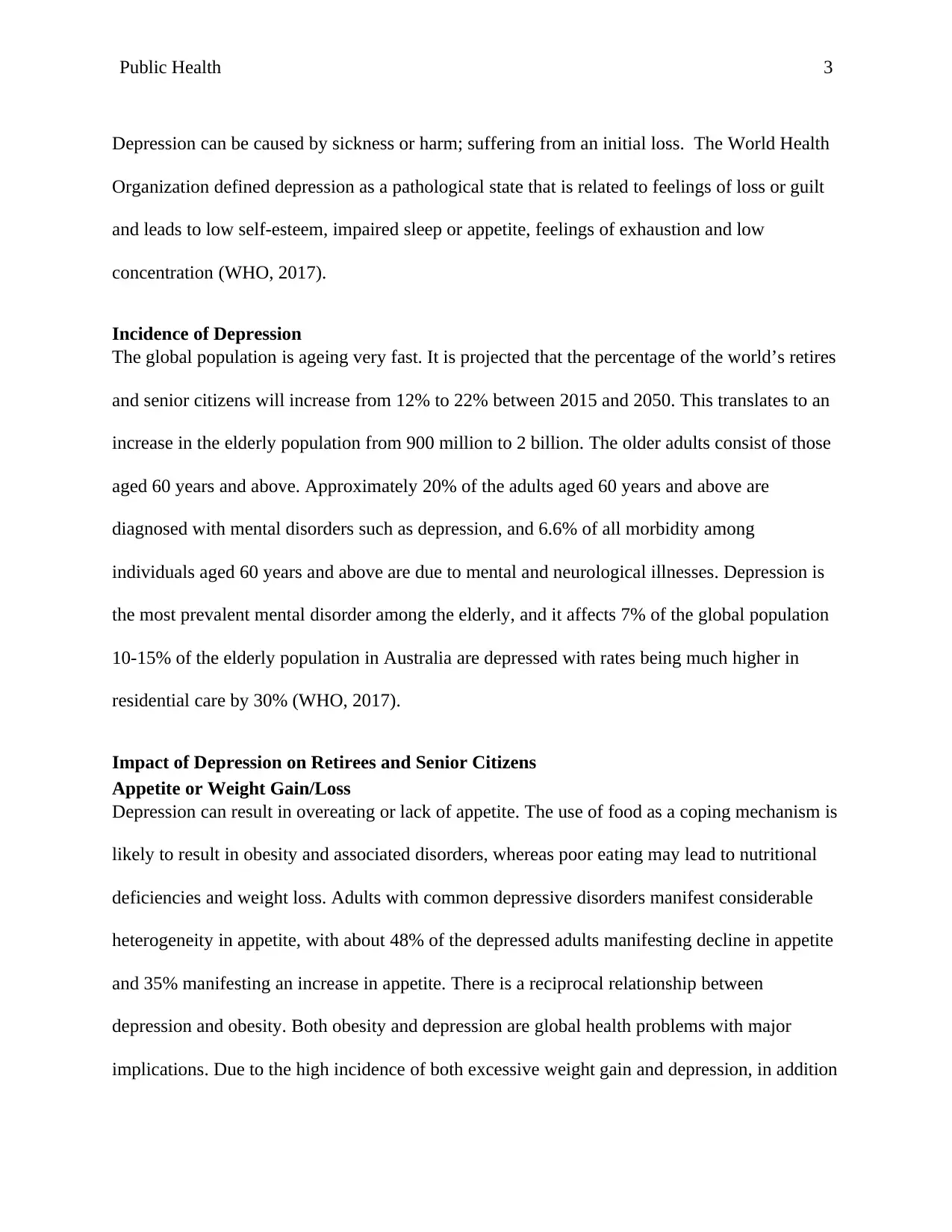
Public Health 3
Depression can be caused by sickness or harm; suffering from an initial loss. The World Health
Organization defined depression as a pathological state that is related to feelings of loss or guilt
and leads to low self-esteem, impaired sleep or appetite, feelings of exhaustion and low
concentration (WHO, 2017).
Incidence of Depression
The global population is ageing very fast. It is projected that the percentage of the world’s retires
and senior citizens will increase from 12% to 22% between 2015 and 2050. This translates to an
increase in the elderly population from 900 million to 2 billion. The older adults consist of those
aged 60 years and above. Approximately 20% of the adults aged 60 years and above are
diagnosed with mental disorders such as depression, and 6.6% of all morbidity among
individuals aged 60 years and above are due to mental and neurological illnesses. Depression is
the most prevalent mental disorder among the elderly, and it affects 7% of the global population
10-15% of the elderly population in Australia are depressed with rates being much higher in
residential care by 30% (WHO, 2017).
Impact of Depression on Retirees and Senior Citizens
Appetite or Weight Gain/Loss
Depression can result in overeating or lack of appetite. The use of food as a coping mechanism is
likely to result in obesity and associated disorders, whereas poor eating may lead to nutritional
deficiencies and weight loss. Adults with common depressive disorders manifest considerable
heterogeneity in appetite, with about 48% of the depressed adults manifesting decline in appetite
and 35% manifesting an increase in appetite. There is a reciprocal relationship between
depression and obesity. Both obesity and depression are global health problems with major
implications. Due to the high incidence of both excessive weight gain and depression, in addition
Depression can be caused by sickness or harm; suffering from an initial loss. The World Health
Organization defined depression as a pathological state that is related to feelings of loss or guilt
and leads to low self-esteem, impaired sleep or appetite, feelings of exhaustion and low
concentration (WHO, 2017).
Incidence of Depression
The global population is ageing very fast. It is projected that the percentage of the world’s retires
and senior citizens will increase from 12% to 22% between 2015 and 2050. This translates to an
increase in the elderly population from 900 million to 2 billion. The older adults consist of those
aged 60 years and above. Approximately 20% of the adults aged 60 years and above are
diagnosed with mental disorders such as depression, and 6.6% of all morbidity among
individuals aged 60 years and above are due to mental and neurological illnesses. Depression is
the most prevalent mental disorder among the elderly, and it affects 7% of the global population
10-15% of the elderly population in Australia are depressed with rates being much higher in
residential care by 30% (WHO, 2017).
Impact of Depression on Retirees and Senior Citizens
Appetite or Weight Gain/Loss
Depression can result in overeating or lack of appetite. The use of food as a coping mechanism is
likely to result in obesity and associated disorders, whereas poor eating may lead to nutritional
deficiencies and weight loss. Adults with common depressive disorders manifest considerable
heterogeneity in appetite, with about 48% of the depressed adults manifesting decline in appetite
and 35% manifesting an increase in appetite. There is a reciprocal relationship between
depression and obesity. Both obesity and depression are global health problems with major
implications. Due to the high incidence of both excessive weight gain and depression, in addition
⊘ This is a preview!⊘
Do you want full access?
Subscribe today to unlock all pages.

Trusted by 1+ million students worldwide
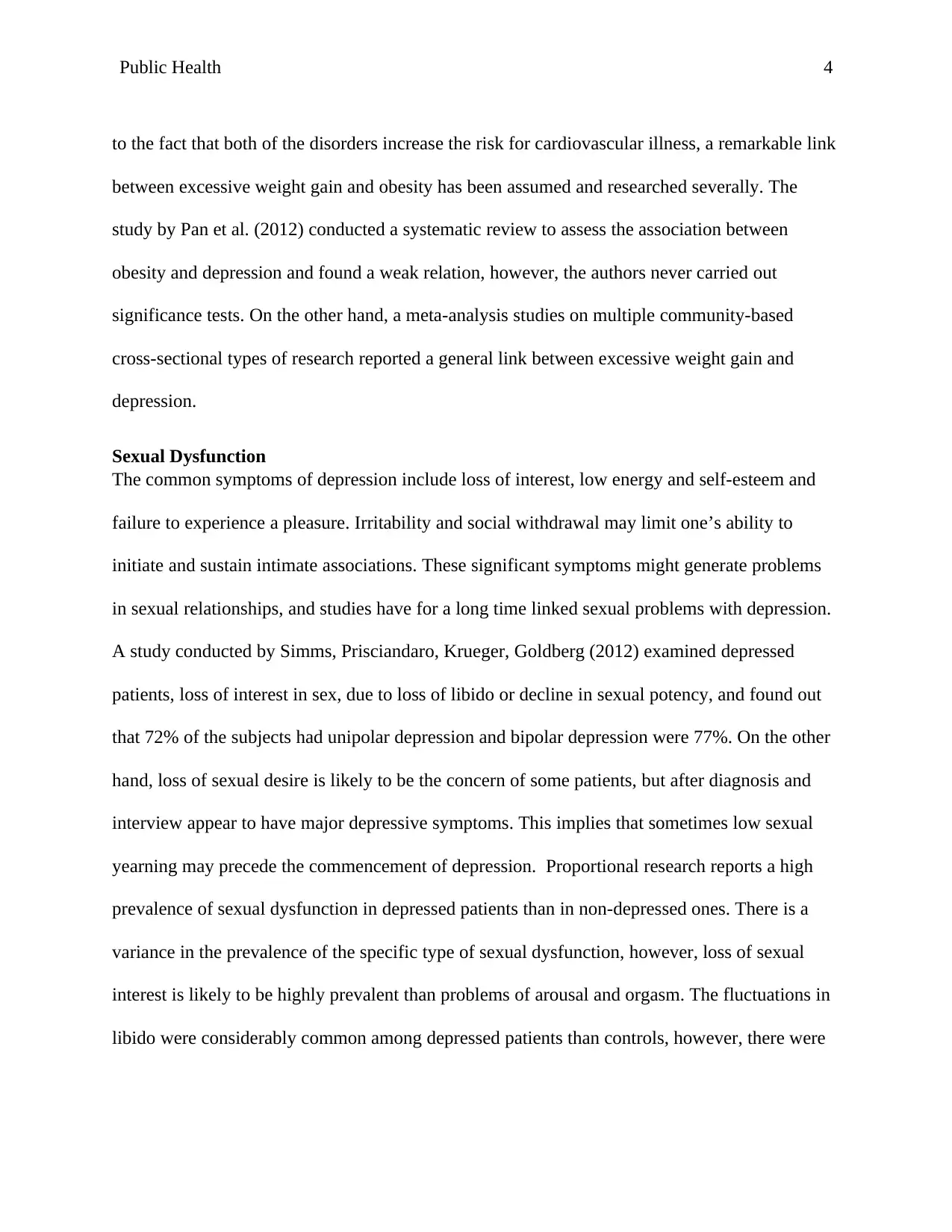
Public Health 4
to the fact that both of the disorders increase the risk for cardiovascular illness, a remarkable link
between excessive weight gain and obesity has been assumed and researched severally. The
study by Pan et al. (2012) conducted a systematic review to assess the association between
obesity and depression and found a weak relation, however, the authors never carried out
significance tests. On the other hand, a meta-analysis studies on multiple community-based
cross-sectional types of research reported a general link between excessive weight gain and
depression.
Sexual Dysfunction
The common symptoms of depression include loss of interest, low energy and self-esteem and
failure to experience a pleasure. Irritability and social withdrawal may limit one’s ability to
initiate and sustain intimate associations. These significant symptoms might generate problems
in sexual relationships, and studies have for a long time linked sexual problems with depression.
A study conducted by Simms, Prisciandaro, Krueger, Goldberg (2012) examined depressed
patients, loss of interest in sex, due to loss of libido or decline in sexual potency, and found out
that 72% of the subjects had unipolar depression and bipolar depression were 77%. On the other
hand, loss of sexual desire is likely to be the concern of some patients, but after diagnosis and
interview appear to have major depressive symptoms. This implies that sometimes low sexual
yearning may precede the commencement of depression. Proportional research reports a high
prevalence of sexual dysfunction in depressed patients than in non-depressed ones. There is a
variance in the prevalence of the specific type of sexual dysfunction, however, loss of sexual
interest is likely to be highly prevalent than problems of arousal and orgasm. The fluctuations in
libido were considerably common among depressed patients than controls, however, there were
to the fact that both of the disorders increase the risk for cardiovascular illness, a remarkable link
between excessive weight gain and obesity has been assumed and researched severally. The
study by Pan et al. (2012) conducted a systematic review to assess the association between
obesity and depression and found a weak relation, however, the authors never carried out
significance tests. On the other hand, a meta-analysis studies on multiple community-based
cross-sectional types of research reported a general link between excessive weight gain and
depression.
Sexual Dysfunction
The common symptoms of depression include loss of interest, low energy and self-esteem and
failure to experience a pleasure. Irritability and social withdrawal may limit one’s ability to
initiate and sustain intimate associations. These significant symptoms might generate problems
in sexual relationships, and studies have for a long time linked sexual problems with depression.
A study conducted by Simms, Prisciandaro, Krueger, Goldberg (2012) examined depressed
patients, loss of interest in sex, due to loss of libido or decline in sexual potency, and found out
that 72% of the subjects had unipolar depression and bipolar depression were 77%. On the other
hand, loss of sexual desire is likely to be the concern of some patients, but after diagnosis and
interview appear to have major depressive symptoms. This implies that sometimes low sexual
yearning may precede the commencement of depression. Proportional research reports a high
prevalence of sexual dysfunction in depressed patients than in non-depressed ones. There is a
variance in the prevalence of the specific type of sexual dysfunction, however, loss of sexual
interest is likely to be highly prevalent than problems of arousal and orgasm. The fluctuations in
libido were considerably common among depressed patients than controls, however, there were
Paraphrase This Document
Need a fresh take? Get an instant paraphrase of this document with our AI Paraphraser
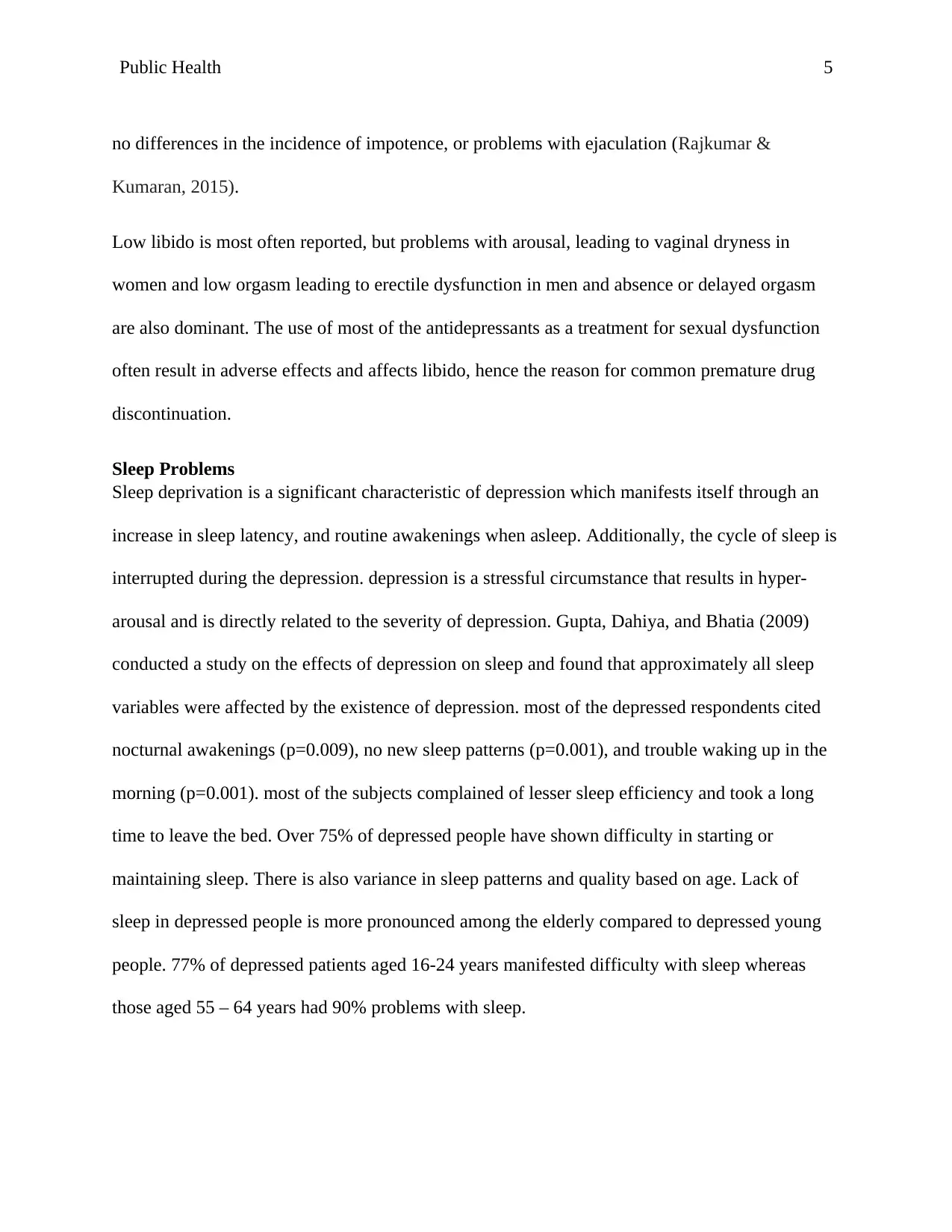
Public Health 5
no differences in the incidence of impotence, or problems with ejaculation (Rajkumar &
Kumaran, 2015).
Low libido is most often reported, but problems with arousal, leading to vaginal dryness in
women and low orgasm leading to erectile dysfunction in men and absence or delayed orgasm
are also dominant. The use of most of the antidepressants as a treatment for sexual dysfunction
often result in adverse effects and affects libido, hence the reason for common premature drug
discontinuation.
Sleep Problems
Sleep deprivation is a significant characteristic of depression which manifests itself through an
increase in sleep latency, and routine awakenings when asleep. Additionally, the cycle of sleep is
interrupted during the depression. depression is a stressful circumstance that results in hyper-
arousal and is directly related to the severity of depression. Gupta, Dahiya, and Bhatia (2009)
conducted a study on the effects of depression on sleep and found that approximately all sleep
variables were affected by the existence of depression. most of the depressed respondents cited
nocturnal awakenings (p=0.009), no new sleep patterns (p=0.001), and trouble waking up in the
morning (p=0.001). most of the subjects complained of lesser sleep efficiency and took a long
time to leave the bed. Over 75% of depressed people have shown difficulty in starting or
maintaining sleep. There is also variance in sleep patterns and quality based on age. Lack of
sleep in depressed people is more pronounced among the elderly compared to depressed young
people. 77% of depressed patients aged 16-24 years manifested difficulty with sleep whereas
those aged 55 – 64 years had 90% problems with sleep.
no differences in the incidence of impotence, or problems with ejaculation (Rajkumar &
Kumaran, 2015).
Low libido is most often reported, but problems with arousal, leading to vaginal dryness in
women and low orgasm leading to erectile dysfunction in men and absence or delayed orgasm
are also dominant. The use of most of the antidepressants as a treatment for sexual dysfunction
often result in adverse effects and affects libido, hence the reason for common premature drug
discontinuation.
Sleep Problems
Sleep deprivation is a significant characteristic of depression which manifests itself through an
increase in sleep latency, and routine awakenings when asleep. Additionally, the cycle of sleep is
interrupted during the depression. depression is a stressful circumstance that results in hyper-
arousal and is directly related to the severity of depression. Gupta, Dahiya, and Bhatia (2009)
conducted a study on the effects of depression on sleep and found that approximately all sleep
variables were affected by the existence of depression. most of the depressed respondents cited
nocturnal awakenings (p=0.009), no new sleep patterns (p=0.001), and trouble waking up in the
morning (p=0.001). most of the subjects complained of lesser sleep efficiency and took a long
time to leave the bed. Over 75% of depressed people have shown difficulty in starting or
maintaining sleep. There is also variance in sleep patterns and quality based on age. Lack of
sleep in depressed people is more pronounced among the elderly compared to depressed young
people. 77% of depressed patients aged 16-24 years manifested difficulty with sleep whereas
those aged 55 – 64 years had 90% problems with sleep.
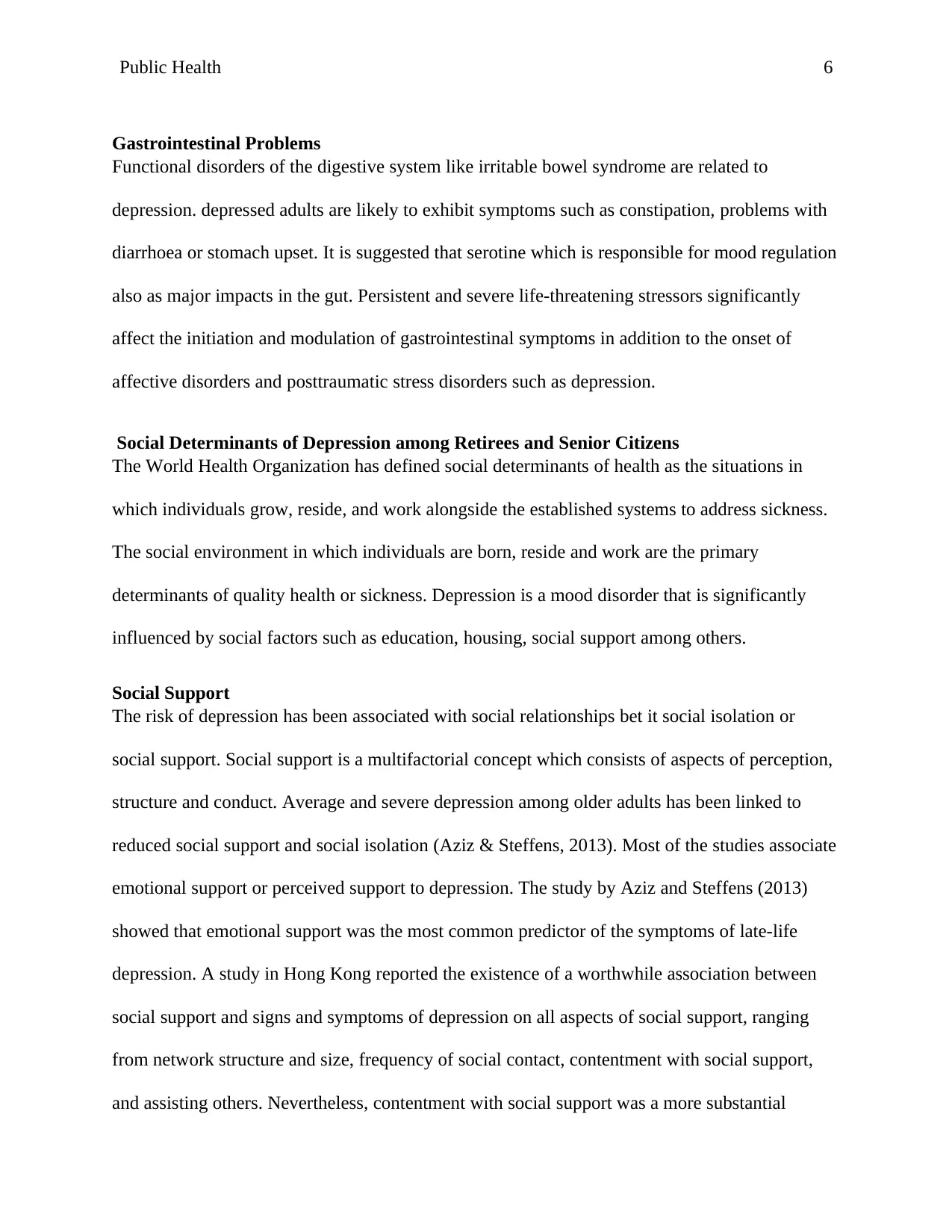
Public Health 6
Gastrointestinal Problems
Functional disorders of the digestive system like irritable bowel syndrome are related to
depression. depressed adults are likely to exhibit symptoms such as constipation, problems with
diarrhoea or stomach upset. It is suggested that serotine which is responsible for mood regulation
also as major impacts in the gut. Persistent and severe life-threatening stressors significantly
affect the initiation and modulation of gastrointestinal symptoms in addition to the onset of
affective disorders and posttraumatic stress disorders such as depression.
Social Determinants of Depression among Retirees and Senior Citizens
The World Health Organization has defined social determinants of health as the situations in
which individuals grow, reside, and work alongside the established systems to address sickness.
The social environment in which individuals are born, reside and work are the primary
determinants of quality health or sickness. Depression is a mood disorder that is significantly
influenced by social factors such as education, housing, social support among others.
Social Support
The risk of depression has been associated with social relationships bet it social isolation or
social support. Social support is a multifactorial concept which consists of aspects of perception,
structure and conduct. Average and severe depression among older adults has been linked to
reduced social support and social isolation (Aziz & Steffens, 2013). Most of the studies associate
emotional support or perceived support to depression. The study by Aziz and Steffens (2013)
showed that emotional support was the most common predictor of the symptoms of late-life
depression. A study in Hong Kong reported the existence of a worthwhile association between
social support and signs and symptoms of depression on all aspects of social support, ranging
from network structure and size, frequency of social contact, contentment with social support,
and assisting others. Nevertheless, contentment with social support was a more substantial
Gastrointestinal Problems
Functional disorders of the digestive system like irritable bowel syndrome are related to
depression. depressed adults are likely to exhibit symptoms such as constipation, problems with
diarrhoea or stomach upset. It is suggested that serotine which is responsible for mood regulation
also as major impacts in the gut. Persistent and severe life-threatening stressors significantly
affect the initiation and modulation of gastrointestinal symptoms in addition to the onset of
affective disorders and posttraumatic stress disorders such as depression.
Social Determinants of Depression among Retirees and Senior Citizens
The World Health Organization has defined social determinants of health as the situations in
which individuals grow, reside, and work alongside the established systems to address sickness.
The social environment in which individuals are born, reside and work are the primary
determinants of quality health or sickness. Depression is a mood disorder that is significantly
influenced by social factors such as education, housing, social support among others.
Social Support
The risk of depression has been associated with social relationships bet it social isolation or
social support. Social support is a multifactorial concept which consists of aspects of perception,
structure and conduct. Average and severe depression among older adults has been linked to
reduced social support and social isolation (Aziz & Steffens, 2013). Most of the studies associate
emotional support or perceived support to depression. The study by Aziz and Steffens (2013)
showed that emotional support was the most common predictor of the symptoms of late-life
depression. A study in Hong Kong reported the existence of a worthwhile association between
social support and signs and symptoms of depression on all aspects of social support, ranging
from network structure and size, frequency of social contact, contentment with social support,
and assisting others. Nevertheless, contentment with social support was a more substantial
⊘ This is a preview!⊘
Do you want full access?
Subscribe today to unlock all pages.

Trusted by 1+ million students worldwide
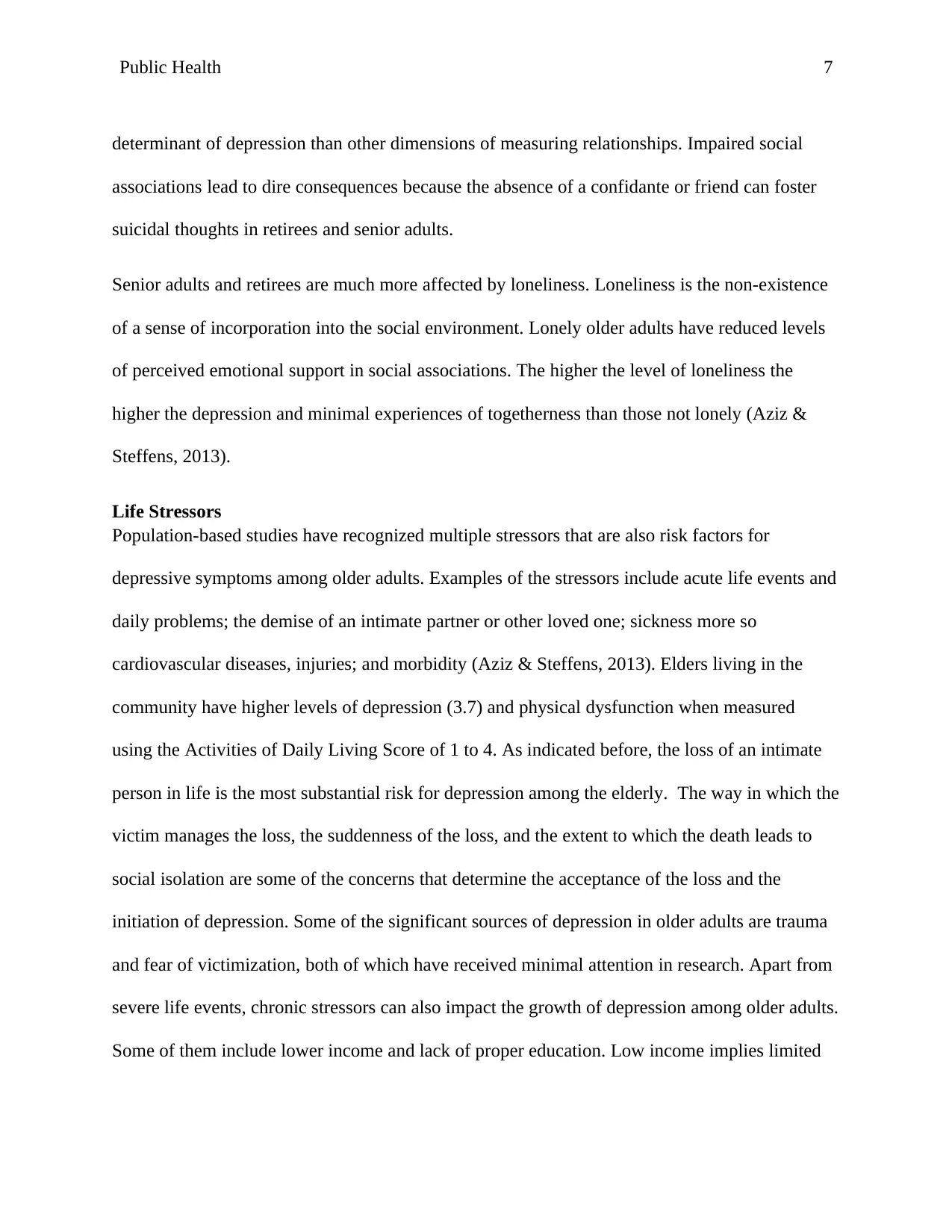
Public Health 7
determinant of depression than other dimensions of measuring relationships. Impaired social
associations lead to dire consequences because the absence of a confidante or friend can foster
suicidal thoughts in retirees and senior adults.
Senior adults and retirees are much more affected by loneliness. Loneliness is the non-existence
of a sense of incorporation into the social environment. Lonely older adults have reduced levels
of perceived emotional support in social associations. The higher the level of loneliness the
higher the depression and minimal experiences of togetherness than those not lonely (Aziz &
Steffens, 2013).
Life Stressors
Population-based studies have recognized multiple stressors that are also risk factors for
depressive symptoms among older adults. Examples of the stressors include acute life events and
daily problems; the demise of an intimate partner or other loved one; sickness more so
cardiovascular diseases, injuries; and morbidity (Aziz & Steffens, 2013). Elders living in the
community have higher levels of depression (3.7) and physical dysfunction when measured
using the Activities of Daily Living Score of 1 to 4. As indicated before, the loss of an intimate
person in life is the most substantial risk for depression among the elderly. The way in which the
victim manages the loss, the suddenness of the loss, and the extent to which the death leads to
social isolation are some of the concerns that determine the acceptance of the loss and the
initiation of depression. Some of the significant sources of depression in older adults are trauma
and fear of victimization, both of which have received minimal attention in research. Apart from
severe life events, chronic stressors can also impact the growth of depression among older adults.
Some of them include lower income and lack of proper education. Low income implies limited
determinant of depression than other dimensions of measuring relationships. Impaired social
associations lead to dire consequences because the absence of a confidante or friend can foster
suicidal thoughts in retirees and senior adults.
Senior adults and retirees are much more affected by loneliness. Loneliness is the non-existence
of a sense of incorporation into the social environment. Lonely older adults have reduced levels
of perceived emotional support in social associations. The higher the level of loneliness the
higher the depression and minimal experiences of togetherness than those not lonely (Aziz &
Steffens, 2013).
Life Stressors
Population-based studies have recognized multiple stressors that are also risk factors for
depressive symptoms among older adults. Examples of the stressors include acute life events and
daily problems; the demise of an intimate partner or other loved one; sickness more so
cardiovascular diseases, injuries; and morbidity (Aziz & Steffens, 2013). Elders living in the
community have higher levels of depression (3.7) and physical dysfunction when measured
using the Activities of Daily Living Score of 1 to 4. As indicated before, the loss of an intimate
person in life is the most substantial risk for depression among the elderly. The way in which the
victim manages the loss, the suddenness of the loss, and the extent to which the death leads to
social isolation are some of the concerns that determine the acceptance of the loss and the
initiation of depression. Some of the significant sources of depression in older adults are trauma
and fear of victimization, both of which have received minimal attention in research. Apart from
severe life events, chronic stressors can also impact the growth of depression among older adults.
Some of them include lower income and lack of proper education. Low income implies limited
Paraphrase This Document
Need a fresh take? Get an instant paraphrase of this document with our AI Paraphraser
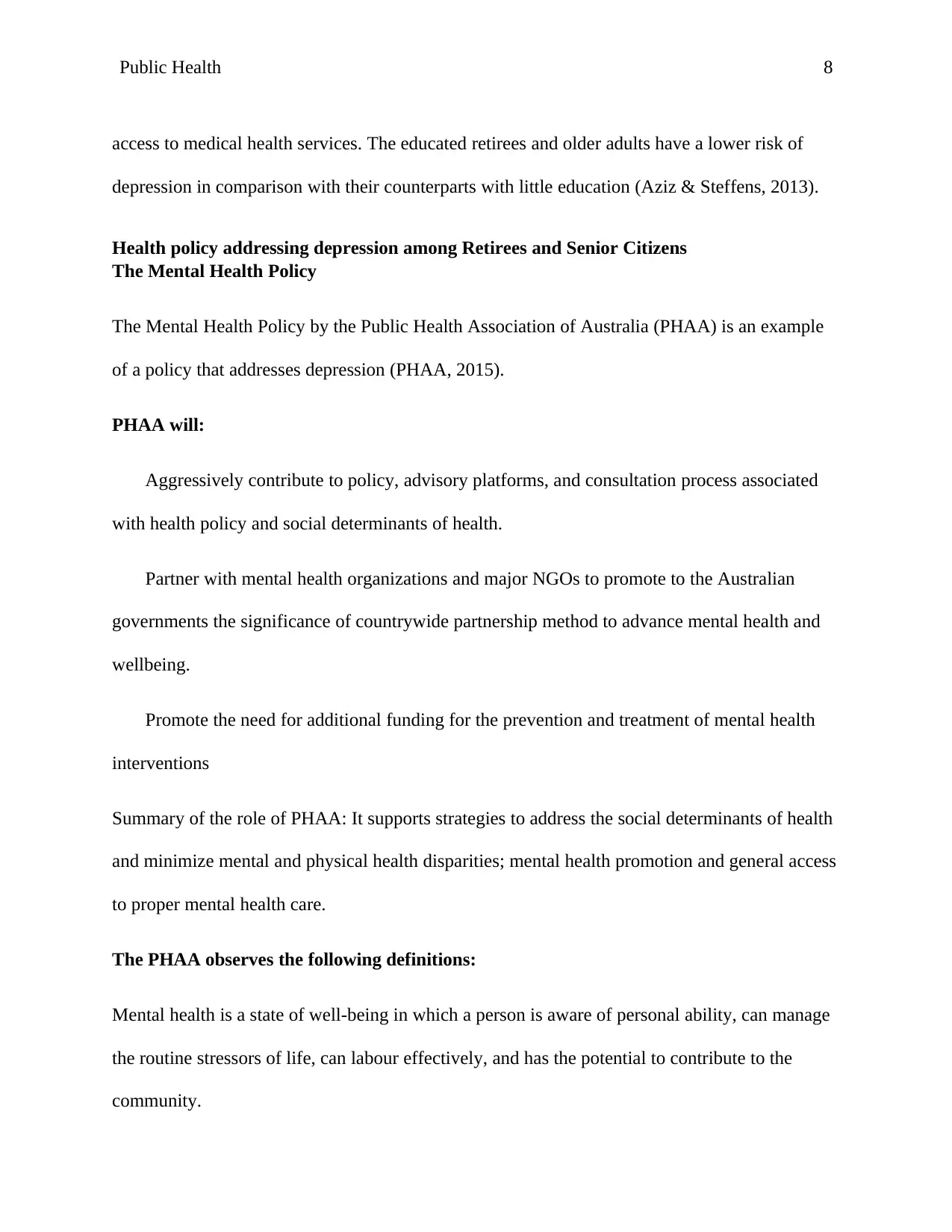
Public Health 8
access to medical health services. The educated retirees and older adults have a lower risk of
depression in comparison with their counterparts with little education (Aziz & Steffens, 2013).
Health policy addressing depression among Retirees and Senior Citizens
The Mental Health Policy
The Mental Health Policy by the Public Health Association of Australia (PHAA) is an example
of a policy that addresses depression (PHAA, 2015).
PHAA will:
Aggressively contribute to policy, advisory platforms, and consultation process associated
with health policy and social determinants of health.
Partner with mental health organizations and major NGOs to promote to the Australian
governments the significance of countrywide partnership method to advance mental health and
wellbeing.
Promote the need for additional funding for the prevention and treatment of mental health
interventions
Summary of the role of PHAA: It supports strategies to address the social determinants of health
and minimize mental and physical health disparities; mental health promotion and general access
to proper mental health care.
The PHAA observes the following definitions:
Mental health is a state of well-being in which a person is aware of personal ability, can manage
the routine stressors of life, can labour effectively, and has the potential to contribute to the
community.
access to medical health services. The educated retirees and older adults have a lower risk of
depression in comparison with their counterparts with little education (Aziz & Steffens, 2013).
Health policy addressing depression among Retirees and Senior Citizens
The Mental Health Policy
The Mental Health Policy by the Public Health Association of Australia (PHAA) is an example
of a policy that addresses depression (PHAA, 2015).
PHAA will:
Aggressively contribute to policy, advisory platforms, and consultation process associated
with health policy and social determinants of health.
Partner with mental health organizations and major NGOs to promote to the Australian
governments the significance of countrywide partnership method to advance mental health and
wellbeing.
Promote the need for additional funding for the prevention and treatment of mental health
interventions
Summary of the role of PHAA: It supports strategies to address the social determinants of health
and minimize mental and physical health disparities; mental health promotion and general access
to proper mental health care.
The PHAA observes the following definitions:
Mental health is a state of well-being in which a person is aware of personal ability, can manage
the routine stressors of life, can labour effectively, and has the potential to contribute to the
community.
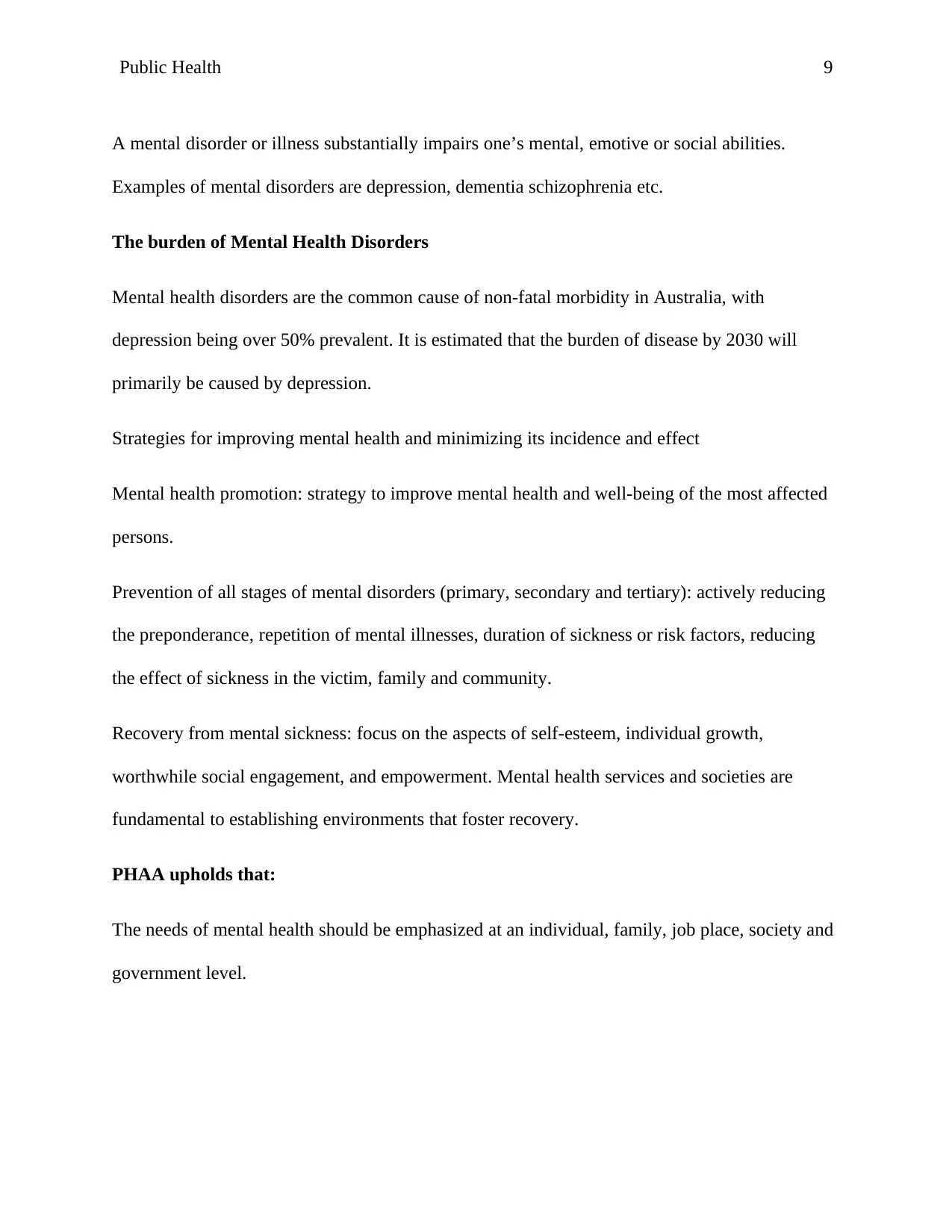
Public Health 9
A mental disorder or illness substantially impairs one’s mental, emotive or social abilities.
Examples of mental disorders are depression, dementia schizophrenia etc.
The burden of Mental Health Disorders
Mental health disorders are the common cause of non-fatal morbidity in Australia, with
depression being over 50% prevalent. It is estimated that the burden of disease by 2030 will
primarily be caused by depression.
Strategies for improving mental health and minimizing its incidence and effect
Mental health promotion: strategy to improve mental health and well-being of the most affected
persons.
Prevention of all stages of mental disorders (primary, secondary and tertiary): actively reducing
the preponderance, repetition of mental illnesses, duration of sickness or risk factors, reducing
the effect of sickness in the victim, family and community.
Recovery from mental sickness: focus on the aspects of self-esteem, individual growth,
worthwhile social engagement, and empowerment. Mental health services and societies are
fundamental to establishing environments that foster recovery.
PHAA upholds that:
The needs of mental health should be emphasized at an individual, family, job place, society and
government level.
A mental disorder or illness substantially impairs one’s mental, emotive or social abilities.
Examples of mental disorders are depression, dementia schizophrenia etc.
The burden of Mental Health Disorders
Mental health disorders are the common cause of non-fatal morbidity in Australia, with
depression being over 50% prevalent. It is estimated that the burden of disease by 2030 will
primarily be caused by depression.
Strategies for improving mental health and minimizing its incidence and effect
Mental health promotion: strategy to improve mental health and well-being of the most affected
persons.
Prevention of all stages of mental disorders (primary, secondary and tertiary): actively reducing
the preponderance, repetition of mental illnesses, duration of sickness or risk factors, reducing
the effect of sickness in the victim, family and community.
Recovery from mental sickness: focus on the aspects of self-esteem, individual growth,
worthwhile social engagement, and empowerment. Mental health services and societies are
fundamental to establishing environments that foster recovery.
PHAA upholds that:
The needs of mental health should be emphasized at an individual, family, job place, society and
government level.
⊘ This is a preview!⊘
Do you want full access?
Subscribe today to unlock all pages.

Trusted by 1+ million students worldwide
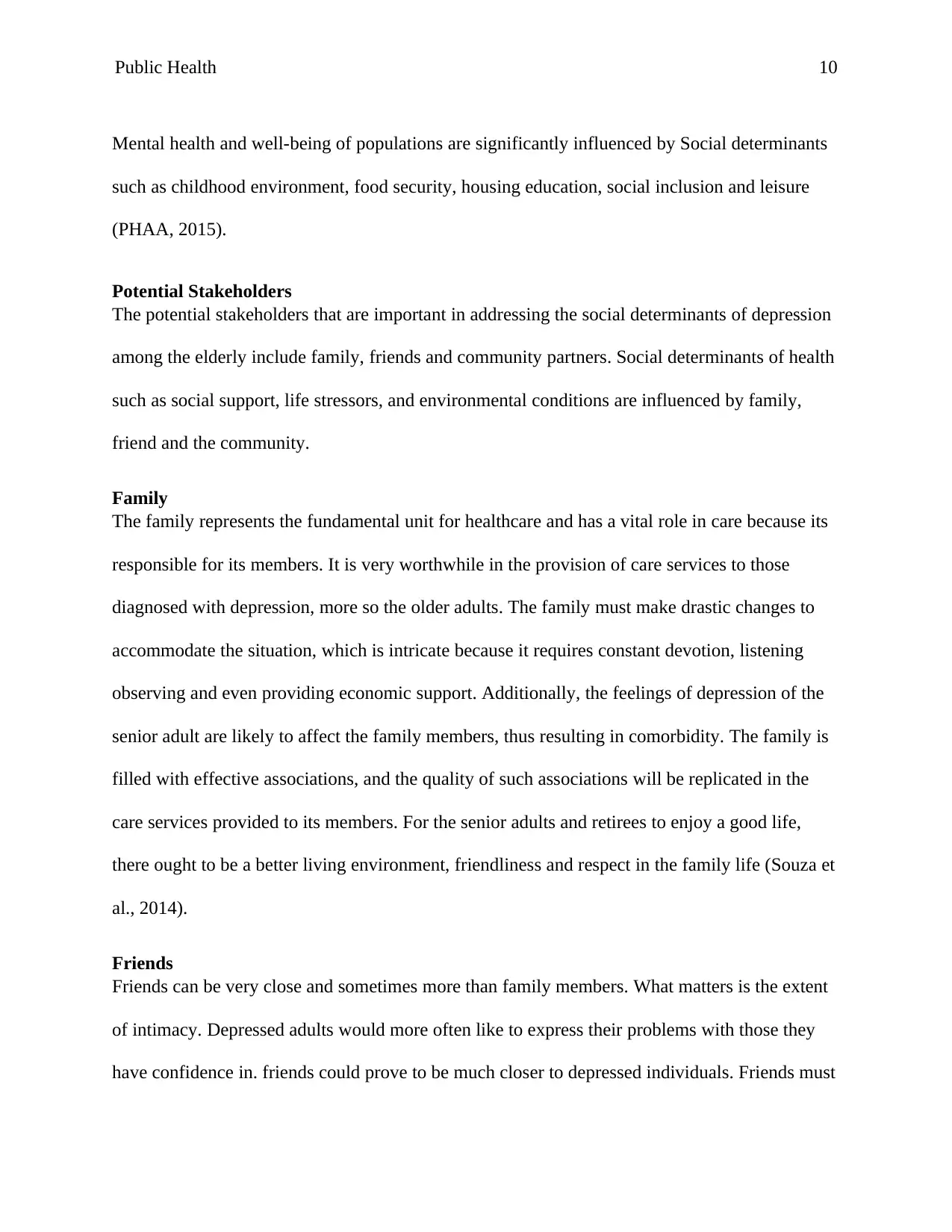
Public Health 10
Mental health and well-being of populations are significantly influenced by Social determinants
such as childhood environment, food security, housing education, social inclusion and leisure
(PHAA, 2015).
Potential Stakeholders
The potential stakeholders that are important in addressing the social determinants of depression
among the elderly include family, friends and community partners. Social determinants of health
such as social support, life stressors, and environmental conditions are influenced by family,
friend and the community.
Family
The family represents the fundamental unit for healthcare and has a vital role in care because its
responsible for its members. It is very worthwhile in the provision of care services to those
diagnosed with depression, more so the older adults. The family must make drastic changes to
accommodate the situation, which is intricate because it requires constant devotion, listening
observing and even providing economic support. Additionally, the feelings of depression of the
senior adult are likely to affect the family members, thus resulting in comorbidity. The family is
filled with effective associations, and the quality of such associations will be replicated in the
care services provided to its members. For the senior adults and retirees to enjoy a good life,
there ought to be a better living environment, friendliness and respect in the family life (Souza et
al., 2014).
Friends
Friends can be very close and sometimes more than family members. What matters is the extent
of intimacy. Depressed adults would more often like to express their problems with those they
have confidence in. friends could prove to be much closer to depressed individuals. Friends must
Mental health and well-being of populations are significantly influenced by Social determinants
such as childhood environment, food security, housing education, social inclusion and leisure
(PHAA, 2015).
Potential Stakeholders
The potential stakeholders that are important in addressing the social determinants of depression
among the elderly include family, friends and community partners. Social determinants of health
such as social support, life stressors, and environmental conditions are influenced by family,
friend and the community.
Family
The family represents the fundamental unit for healthcare and has a vital role in care because its
responsible for its members. It is very worthwhile in the provision of care services to those
diagnosed with depression, more so the older adults. The family must make drastic changes to
accommodate the situation, which is intricate because it requires constant devotion, listening
observing and even providing economic support. Additionally, the feelings of depression of the
senior adult are likely to affect the family members, thus resulting in comorbidity. The family is
filled with effective associations, and the quality of such associations will be replicated in the
care services provided to its members. For the senior adults and retirees to enjoy a good life,
there ought to be a better living environment, friendliness and respect in the family life (Souza et
al., 2014).
Friends
Friends can be very close and sometimes more than family members. What matters is the extent
of intimacy. Depressed adults would more often like to express their problems with those they
have confidence in. friends could prove to be much closer to depressed individuals. Friends must
Paraphrase This Document
Need a fresh take? Get an instant paraphrase of this document with our AI Paraphraser
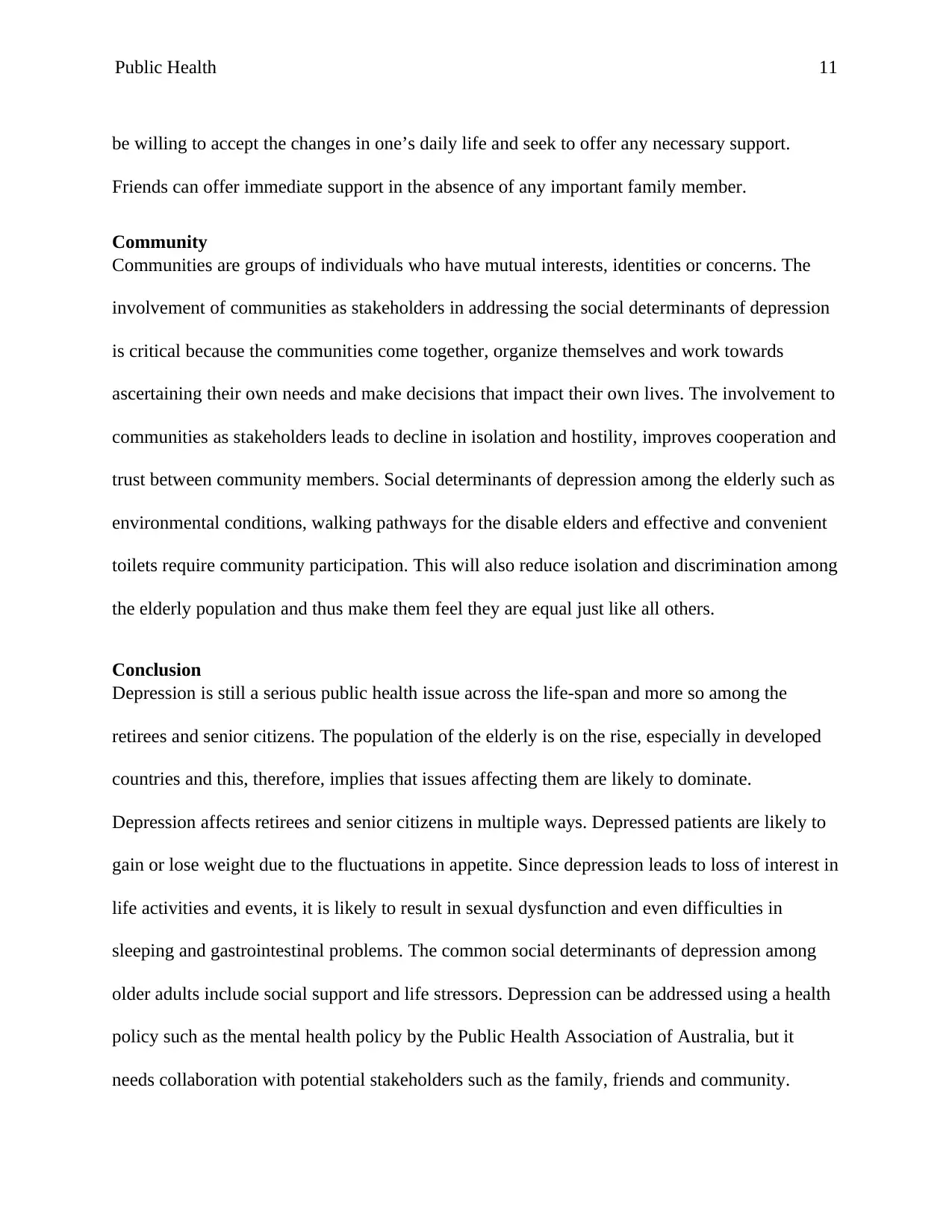
Public Health 11
be willing to accept the changes in one’s daily life and seek to offer any necessary support.
Friends can offer immediate support in the absence of any important family member.
Community
Communities are groups of individuals who have mutual interests, identities or concerns. The
involvement of communities as stakeholders in addressing the social determinants of depression
is critical because the communities come together, organize themselves and work towards
ascertaining their own needs and make decisions that impact their own lives. The involvement to
communities as stakeholders leads to decline in isolation and hostility, improves cooperation and
trust between community members. Social determinants of depression among the elderly such as
environmental conditions, walking pathways for the disable elders and effective and convenient
toilets require community participation. This will also reduce isolation and discrimination among
the elderly population and thus make them feel they are equal just like all others.
Conclusion
Depression is still a serious public health issue across the life-span and more so among the
retirees and senior citizens. The population of the elderly is on the rise, especially in developed
countries and this, therefore, implies that issues affecting them are likely to dominate.
Depression affects retirees and senior citizens in multiple ways. Depressed patients are likely to
gain or lose weight due to the fluctuations in appetite. Since depression leads to loss of interest in
life activities and events, it is likely to result in sexual dysfunction and even difficulties in
sleeping and gastrointestinal problems. The common social determinants of depression among
older adults include social support and life stressors. Depression can be addressed using a health
policy such as the mental health policy by the Public Health Association of Australia, but it
needs collaboration with potential stakeholders such as the family, friends and community.
be willing to accept the changes in one’s daily life and seek to offer any necessary support.
Friends can offer immediate support in the absence of any important family member.
Community
Communities are groups of individuals who have mutual interests, identities or concerns. The
involvement of communities as stakeholders in addressing the social determinants of depression
is critical because the communities come together, organize themselves and work towards
ascertaining their own needs and make decisions that impact their own lives. The involvement to
communities as stakeholders leads to decline in isolation and hostility, improves cooperation and
trust between community members. Social determinants of depression among the elderly such as
environmental conditions, walking pathways for the disable elders and effective and convenient
toilets require community participation. This will also reduce isolation and discrimination among
the elderly population and thus make them feel they are equal just like all others.
Conclusion
Depression is still a serious public health issue across the life-span and more so among the
retirees and senior citizens. The population of the elderly is on the rise, especially in developed
countries and this, therefore, implies that issues affecting them are likely to dominate.
Depression affects retirees and senior citizens in multiple ways. Depressed patients are likely to
gain or lose weight due to the fluctuations in appetite. Since depression leads to loss of interest in
life activities and events, it is likely to result in sexual dysfunction and even difficulties in
sleeping and gastrointestinal problems. The common social determinants of depression among
older adults include social support and life stressors. Depression can be addressed using a health
policy such as the mental health policy by the Public Health Association of Australia, but it
needs collaboration with potential stakeholders such as the family, friends and community.
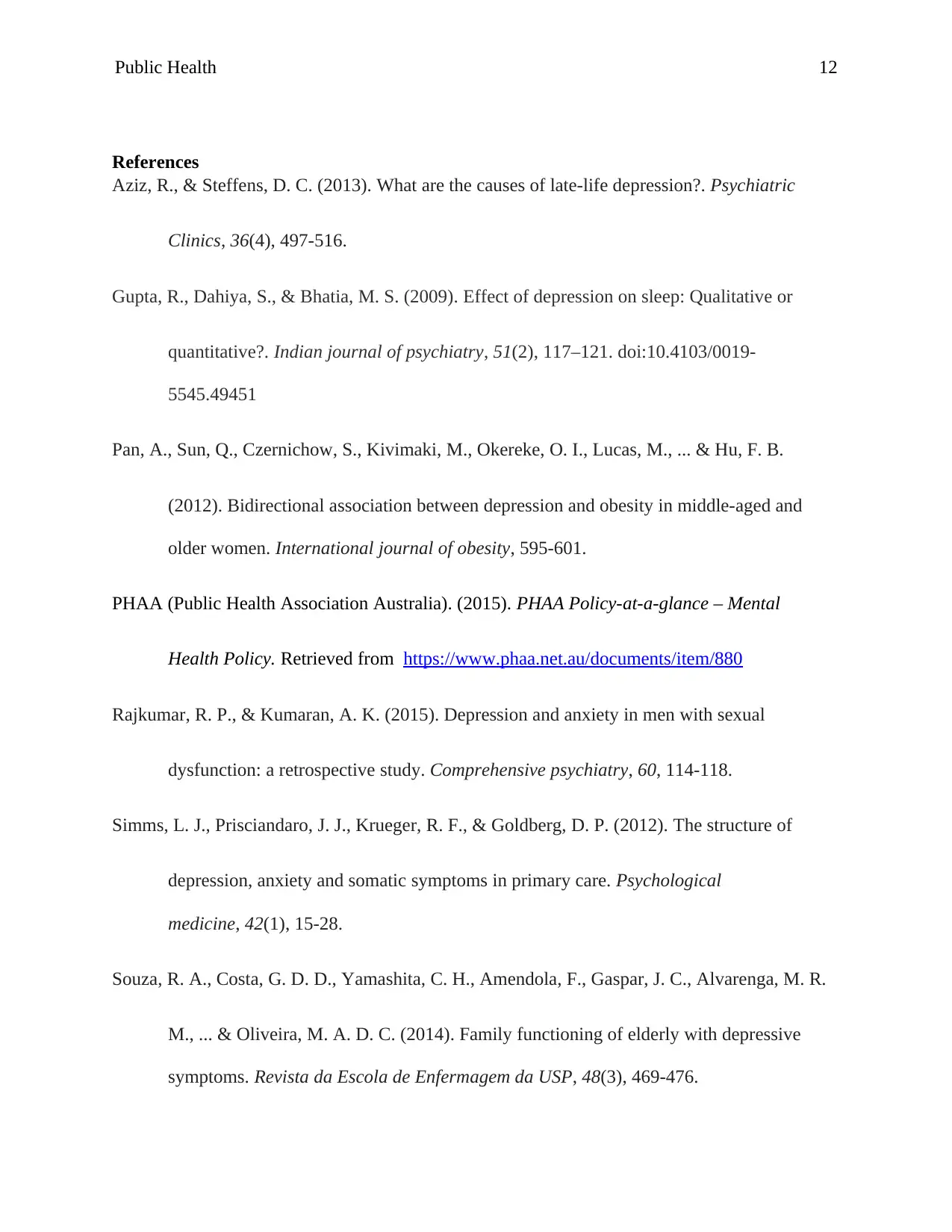
Public Health 12
References
Aziz, R., & Steffens, D. C. (2013). What are the causes of late-life depression?. Psychiatric
Clinics, 36(4), 497-516.
Gupta, R., Dahiya, S., & Bhatia, M. S. (2009). Effect of depression on sleep: Qualitative or
quantitative?. Indian journal of psychiatry, 51(2), 117–121. doi:10.4103/0019-
5545.49451
Pan, A., Sun, Q., Czernichow, S., Kivimaki, M., Okereke, O. I., Lucas, M., ... & Hu, F. B.
(2012). Bidirectional association between depression and obesity in middle-aged and
older women. International journal of obesity, 595-601.
PHAA (Public Health Association Australia). (2015). PHAA Policy-at-a-glance – Mental
Health Policy. Retrieved from https://www.phaa.net.au/documents/item/880
Rajkumar, R. P., & Kumaran, A. K. (2015). Depression and anxiety in men with sexual
dysfunction: a retrospective study. Comprehensive psychiatry, 60, 114-118.
Simms, L. J., Prisciandaro, J. J., Krueger, R. F., & Goldberg, D. P. (2012). The structure of
depression, anxiety and somatic symptoms in primary care. Psychological
medicine, 42(1), 15-28.
Souza, R. A., Costa, G. D. D., Yamashita, C. H., Amendola, F., Gaspar, J. C., Alvarenga, M. R.
M., ... & Oliveira, M. A. D. C. (2014). Family functioning of elderly with depressive
symptoms. Revista da Escola de Enfermagem da USP, 48(3), 469-476.
References
Aziz, R., & Steffens, D. C. (2013). What are the causes of late-life depression?. Psychiatric
Clinics, 36(4), 497-516.
Gupta, R., Dahiya, S., & Bhatia, M. S. (2009). Effect of depression on sleep: Qualitative or
quantitative?. Indian journal of psychiatry, 51(2), 117–121. doi:10.4103/0019-
5545.49451
Pan, A., Sun, Q., Czernichow, S., Kivimaki, M., Okereke, O. I., Lucas, M., ... & Hu, F. B.
(2012). Bidirectional association between depression and obesity in middle-aged and
older women. International journal of obesity, 595-601.
PHAA (Public Health Association Australia). (2015). PHAA Policy-at-a-glance – Mental
Health Policy. Retrieved from https://www.phaa.net.au/documents/item/880
Rajkumar, R. P., & Kumaran, A. K. (2015). Depression and anxiety in men with sexual
dysfunction: a retrospective study. Comprehensive psychiatry, 60, 114-118.
Simms, L. J., Prisciandaro, J. J., Krueger, R. F., & Goldberg, D. P. (2012). The structure of
depression, anxiety and somatic symptoms in primary care. Psychological
medicine, 42(1), 15-28.
Souza, R. A., Costa, G. D. D., Yamashita, C. H., Amendola, F., Gaspar, J. C., Alvarenga, M. R.
M., ... & Oliveira, M. A. D. C. (2014). Family functioning of elderly with depressive
symptoms. Revista da Escola de Enfermagem da USP, 48(3), 469-476.
⊘ This is a preview!⊘
Do you want full access?
Subscribe today to unlock all pages.

Trusted by 1+ million students worldwide
1 out of 13
Related Documents
Your All-in-One AI-Powered Toolkit for Academic Success.
+13062052269
info@desklib.com
Available 24*7 on WhatsApp / Email
![[object Object]](/_next/static/media/star-bottom.7253800d.svg)
Unlock your academic potential
Copyright © 2020–2026 A2Z Services. All Rights Reserved. Developed and managed by ZUCOL.





